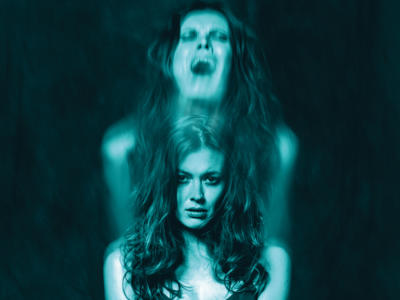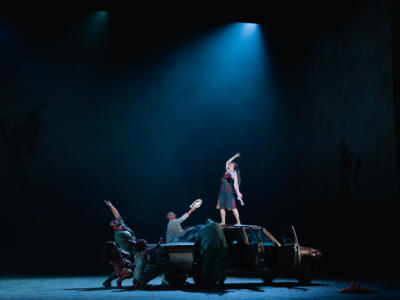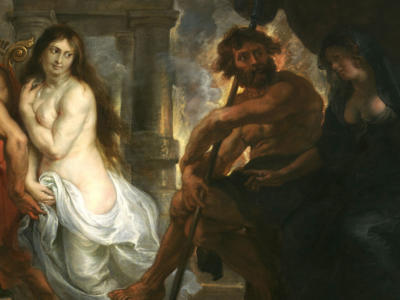Opera's Baddest Witches
Who doesn’t love a good witch and what better way to get some Samhain spirit than have a look at opera’s most excellent enchantresses? Happy Halloween!
The Queen of the Night - Mozart's The Magic Flute
Aria – Hell’s vengeance boils in my heart (‘Der Hölle Rache’)
Video
One of the most notorious soprano roles, the Queen of the Night might just be the most treacherous witch around. Appearing throughout Mozart’s The Magic Flute, this reprehensible ruler is responsible for manipulating the main cast against her mortal enemy Sarastro. Unbeknownst to Tamino (the young Egyptian Prince and protagonist of the opera), Sarastro is a kindly priest of the gods Isis and Osiris who protects the Queen’s daughter Pamina.
Her most famous aria is ‘Hell’s vengeance boils in my heart’ (usually known as ‘Der Hölle Rache’), where the Queen demands that her daughter Pamina assassinate Sarastro, or else she will disown Pamina and curse her: ‘destroyed be forever all the bonds of nature’. Renowned as one of the most difficult (and catchy) arias in the repertoire, ‘Hell’s vengeance’ lends itself to standout performers, letting them steal the show in a fit of rage.
The Queen of the Night was played by Julia Bauer in English National Opera’s 2019 production of Mozart‘s The Magic Flute.
Hecate - Birtwistle's The Mask of Orpheus
2019 Production Trailer
Video
A particularly important deity to the Ancient Greeks, Hecate (also spelt Hekate) has a long-standing legacy in religious rituals stretching to modern-day pagan practices. The goddess of magic, witchcraft, crossroads, and most notably for our tale, necromancy (communication of the dead). Athenians held idols of Hecate at the gates of cities, as well as in households, to protect from malicious outside forces. She also represents something of a triple threat, in the most literal sense – a goddess of three aspects: maiden, mother and crone, and therefore past, present and future.
In the context of Harrison Birtwistle’s The Mask of Orpheus, Hecate masquerades as The Oracle of the Dead to advise the grieving Orpheus on what to do. Her true personage is truly revealed when Orpheus comes before the ruling trio of the Underworld: Hades, Persephone and Hecate, goddess of the witches.
The enigmatic Hecate was played by Claron McFadden in 2019’s The Mask of Orpheus.
The Witch - Humperdinck's Hansel and Gretel
Aria – The Witch’s Ride
Video
Featured heavily in Act 3 of Engelbert Humperdinck’s beloved opera, the Witch is true to the Grimm fairy tale that the opera is based on. Sometimes played as a travesti role (a man playing a female role), the part is usually sung by a mezzo-soprano.
The Witch first appears in the third scene of Act 3, where Hansel and Gretel have found the gingerbread house in the woods and, much like any of us would, begin to start snacking away at it. A voice calls from the depths of the house ‘Nibbling, nibbling, little mouse! Who’s nibbling on my little house?’. After the duo ignores the voice, thinking it the howling wind, the witch emerges from the shack, capturing Hansel and enlisting Gretel to aid her in fattening up the boy for her dinner.
Gretel tricks the Witch into checking the gingerbread in the oven, to which Hansel (having broken out of the cage) and Gretel respond by pushing her into the stove, freeing them and the various children enchanted into gingerbread statues around the house.
The Witch was played (as a travesti role) by Alasdair Elliott and John Findon in the ENO’s production of Hansel and Gretel at Regent Park Open Air Theatre.
Witches - Verdi's Macbeth
Aria – Three times the cat has mewed in heat (‘Tre volte miagola la gatta in fregola’)
Video
The Witches of Giuseppe Verdi’s Macbeth fill the same role as that in Shakespeare’s seminal work. Unlike the original, Verdi’s version has a tad more singing, but no more from these Witches – they are purely spoken parts. Appearing at the start of Act 1 to boast of their evil deeds, before prophesying that Macbeth will become the Thane of Cawdor, then king ‘hereafter’. After they vanish, messengers appear to decree that Macbeth is to become the Thane of Cawdor, leaving Macbeth and Banco to believe the prophecies to be true, leading to the drama and tragedy that follow.
The witches appear once again in Act 3 as Macbeth comes to their cave to seek their counsel, wherein the three witches provide three answers to his pleas: he should beware Macduff, he cannot be harmed by a man ‘born of woman’, and that he won’t be conquered until Birnam Wood marches against him – prophecies which come true as Macduff assaults Macbeth’s castle.
Verdi’s Macbeth was last performed by ENO in 1993.
Ježibaba - Dvořák’s Rusalka
Aria – Abracadabra (‘Čury mury fuk!’)
Video
More widely known in the west as Baba Yaga, Ježibaba is a well-known character in Slavic/Russian folklore. Unlike other witches, Baba Yaga is of ambiguous morality – sometimes she aids the heroes, sometime works against them, depending on her own agenda. Known for roaming the forest of Eastern Europe in her hut mounted on giant chicken legs or flying the skies in her over-sized mortar and pestle.
The title of ‘baba’ comes from the Polish word for ‘old woman’, leading to the Russian ‘babushka’ and Polish ‘babcia’ (grandmother) in modern times. In more the more archaic Old Russian, it had connotations of ‘midwife’, ‘sorceress’ or ‘fortune teller’. These all seem rather appropriate and lead to Baba Yaga embodying the mythological archetype of the totemic matriarchal ancestress – the old crone the protagonist seeks to gain knowledge on their quest.
In Dvořák‘s Rusalka, Ježibaba is the witch who offers Rusalka the gift of mortality, with the caveat that she is struck dumb (silent), and that the Prince must be faithful to her – if either of these conditions are broken, the nymph Rusalka, as well as her beloved, will drop dead. This is the primary drama of the opera, leading to the triumph of the union and the tragedy of Rusalka’s downfall.
Sorceress - Purcell's Dido and Aeneas
Aria – Witches Scene
Video
Purcell’s Dido and Aeneas is one of the earliest known English operas, and may be one of the first depictions of witches in opera.
The Sorceress and her fellow Witches appear in Act 2, where she plots the destruction of the state of Carthage and its queen, Dido. She conjures her minion (a ‘trusty elf’) to disguise himself as Mercury, the messenger god of the Roman pantheon, to approach Aeneas and order him to return to Italy. This would leave Dido heartbroken, leading to her death.
By the end of Act 2, the spell has been successful, leading to the tragic conclusion of the opera, with Dido beseeching that ‘cupids scatter roses on her tomb, soft and gentle as her heart’. Much like many other operas, the crucial action which sets the plot into motion is an act that the Witches were responsible for.
All this comes from the Sorceress’ hate of Dido: ‘ The Queen of Carthage whom we hate, as we do all in prosperous state, ere sunset, shall most wretched prove, depriv’d of fame, of life and love!
ENO last performed Purcell’s Dido and Aeneas in 2019.
Isolde - Wagner's Tristan and Isolde
Aria – Love Duet (Liebesnacht)
Video
The titular character of one of Wagner’s greatest works, Isolde is an Irish princess known for magical healing powers. Prior to the beginning of the opera, she was engaged to Morold, a knight killed by Tristan. Not realizing who he was, she nurses him back to health, before his damaged sword gives away his identity as her betrothed’s murderer. Despite this, she falls in love with Tristan.
As the opera begins, the pair are on their way to Tristan’s homeland of Breton, for Isolde to marry the King. Sending for her box of potions, Isolde mixes what she believes to be a death potion, before sending for Tristan. Convincing him to drink with her, they soon discover that the drink has been swapped by Isolde’s maid and companion, Brangäne. Instead, they’d just ingested a strong love potion – a discovery that ends the opera’s first act.
Isolde was played by Heidi Melton in ENO’s 2016 production of Wagner’s Tristan and Isolde.
Carmen – Bizet’s Carmen
2023 Revival Trailer
Video
Perhaps the wild card of the bunch, Carmen is usually not looked at as a witch in the realm of the others listed above, but we have a good reason to include her on this list… In Act 3 of the opera, the titular heroine has tired of José’s company, and cruelly dismissed him from her company, and the smugglers she finds herself among. To amuse herself, and to distract from her recent actions, she takes to reading her own fortune from a deck of cards. The cards foretell her death, as well as José’s.
Following this, in Act 4 Carmen dies by José’s hand when she rebukes his pleas, and the opera ends with José confessing to his crime – with the insinuation that he will be put to death for Carmen’s murder. Whether this was a self-fulfilling prophecy or not, what the cards told came to light – and what could be witchier than divination?
Carmen was played by Sinead Campbell-Wallace in ENO’s 2023 production of Bizet’s Carmen.



